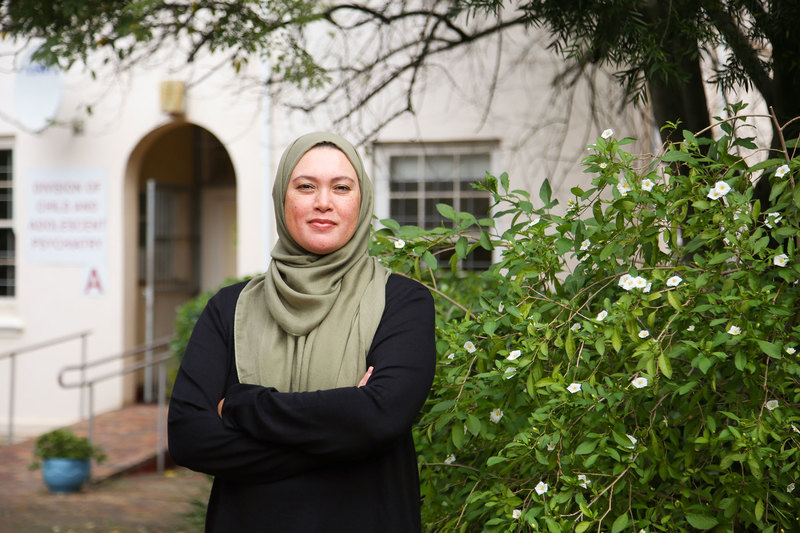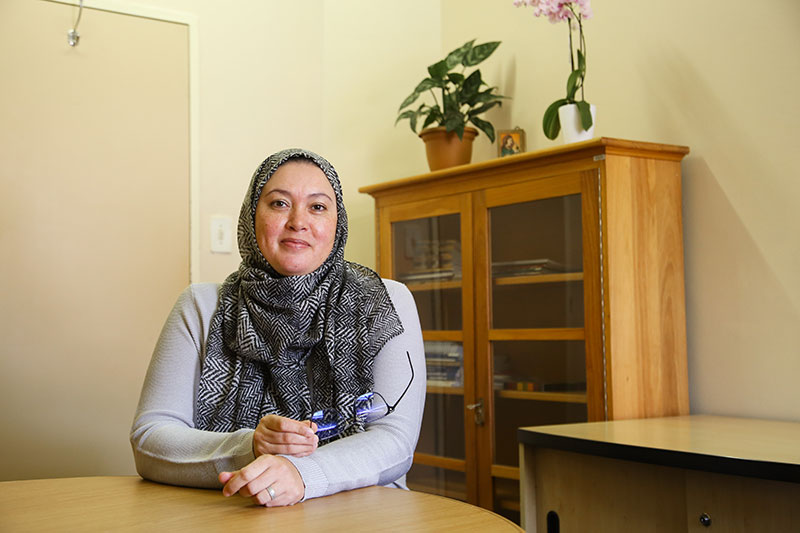Women’s Month: Belhar child activist, academic at the helm of Children’s Institute
22 August 2023 | Story Helen Swingler. Photos Je’nine May. Read time 9 min.
Too many children in South African do not reach their fifth birthday, and when they do survive, they bear the burden of infectious diseases, inadequate nutrition, violence and suboptimal caregiving and learning opportunities. In Women’s Month, UCT News spoke with Associate Professor Wiedaad Slemming, who took the helm of the University of Cape Town’s (UCT) flagship Children’s Institute (CI) earlier this year. Dr Slemming, a children’s advocate and activist, previously worked in the Division of Community Paediatrics at the University of the Witwatersrand.
Helen Swingler (HS): Who is Wiedaad Slemming? Where did you grow up and what were your early ambitions and dreams?
Wiedaad Slemming (WS): I am a mother, a children’s advocate and activist, academic and researcher. I was born and raised in Belhar in a large family of strong women. My first degree was in physiotherapy, as I had ambitions of becoming a sports physiotherapist. My first job was at Red Cross War Memorial Children’s Hospital, and there I discovered that I enjoyed working in paediatrics more than sport. Exposures and interactions in my undergraduate training, and commitments through bursary requirements where I work in disadvantaged communities, including my own, shaped my orientation and later career pathing in public health.

HS: What is your specific area of research?
WS: My particular areas of expertise and research include maternal and child health and nutrition, early childhood development, child disability and health systems strengthening, and I currently serve on international and national technical and advisory groups in these fields.
HS: What attracted you to the post of CI director and what are your main key performance areas?
WS: The CI holds an important and unique space in society for children. The interdisciplinarity of the work and connectedness between the research, advocacy and education it does is able to influence and translate those contributions to meaningfully advance children’s rights, as well as their overall health and well-being. My main goals are to expand the CI footprint and strengthen the unit’s contributions across all these areas of our work.
HS: What have been the primary challenges in your first months in office?
WS: The transition into my new role was well supported by the outgoing director, Professor Shanaaz Mathews; the CI Board; the Department of Paediatrics and Child Health; and the CI staff. The first 100 days was mostly spent getting to know the people, getting a sense of the place, getting to know more about the work we do, the way we do it – and some of the main challenges. However, there are many strengths and a good foundation to build from.
HS: How would you describe your leadership style?
WS: I am someone who has never shied away from a challenge and who has, over time, become more comfortable with dealing with discomfort, as this pushes me to learn and explore new ways of being and doing. In many ways, this has influenced my leadership style, which has also adapted to the needs of the organisation – focusing on building for the future, navigating change and developing the CI and its people in this endeavour. Some would see this as a form of transformational leadership.
HS: What does the CI see as the key challenges facing SA’s children?
WS: South African children face a multiplicity of challenges from the time they are born, exacerbated by the persisting inequalities that plague our country. Still too many children do not reach their fifth birthday, and when they do survive, they face threats from infectious diseases, inadequate nutrition, our inability to protect them from harm – whether intentional or unintentional – suboptimal caregiving and learning opportunities. These may persist as they get older and manifest in compromised physical and mental health and well-being, including increased risk of non-communicable diseases, poor educational outcomes, and decreased economic potential and civic participation, among others, at an individual and societal level.
“These challenges do not only affect individuals and society now, but that we pass these on to subsequent generations.”
What is important to note is that these challenges do not only affect individuals and society now, but that we pass these [challenges] on to subsequent generations. At the same time, children face a future where they will have to deal with the multitude of issues related to climate change and environmental degradation, persisting poverty and inequality, the effects of a rapidly transforming technological landscape, and increasing risks of conflict and displacement. This reinforces the need for and importance of the interdisciplinary work of institutions such as the CI to address these complex societal problems. I am privileged and proud to be able to contribute to effect positive change in society and realise the rights of South African children through our collective endeavours.
HS: The challenges you describe have created a perfect storm for children’s welfare and health. What is the CI’s core function in this and its role in mitigating these challenges?
WS: Our research and advocacy agendas are aligned with major challenges facing children in South Africa, and currently focus on four main interrelated themes:
- alleviating child poverty and deprivation through well-designed and inclusive social protection strategies
- improving child protection systems by strengthening coordination, violence prevention and response strategies
- strengthening early childhood development through a comprehensive package of services and support for children and their caregivers
- strengthening the voice and agency of children.
Our staff – with backgrounds in public health, sociology, law, politics, social work, psychology and communications – pool our skills to investigate the complex social issues affecting children and monitor progress toward advancing children’s rights.
Some highlights of our work reported in our 2021–2022 annual report provide a snapshot of some of the milestones and achievements in this regard. First is that the CI has produced 16 editions of The South African Child Gauge since 2006. We have also produced three research reports and three research briefs on violence against women and children in the past two years as well as an evidence review on preventing violence through schools.
We intervened as amicus curiae [friend of the court] in the court case concerning sanctions applied by the South African Council of Educators (SACE) when teachers are found guilty of administering corporal punishment. The 2022 court judgement directs SACE to meaningfully engage us and the application (the Centre for Child Law) in revising its sanctions. The National Strategic Plan on Gender-Based Violence and Femicide theoretically targets both women and children, but children are at its margins, which we lobbied to correct.
“I wish that we could see more women in leadership positions across all sectors, breaking down barriers and stereotypes.”
We also established a fruitful partnership for early childhood development with community partner True North in Vrygrond in the Western Cape. We are working with them and a local community advisory board to co-create research on the safety participation and inclusion of children in early learning.
Our advocacy contributed to approximately two million caregivers becoming eligible to apply for the Social Relief of Distress grant when the eligibility criteria were amended in late 2021 to include the Child Support Grant caregivers who were below the income threshold of the food poverty line.
In addition, our rapid intervention protected some 31 000 children from losing their Child Support Grant in 2021 by getting the South African Social Security Agency to keep in place its suspension of the cancellation of grants to children without birth certificates. Our advocacy and assistance also helped to ensure that a budget was allocated for the Child Support Grant Top-Up in the 2022/23 financial year – and that its application process was better communicated. By December 2022, 28 000 orphans were receiving the top-up.
HS: What is your wish list for Women’s Month?
WS: I am involved in several initiatives that aim to create more supportive work and home environments for women. My wish is for all women to have agency, the power to make informed choices in life – personally and professionally – and that they are protected from harm. I wish that we could see more women in leadership positions across all sectors, breaking down barriers and stereotypes, and that we can develop a culture where women support and build each other and collaborate to make the changes we would like to see for ourselves and the generations to come.
HS: What do you enjoy doing off duty?
WS: Spending time with my family and friends and connecting with nature. I am happiest when breathing fresh, salty air along the ocean or experiencing the quiet calm of being in the mountains or bushveld.
 This work is licensed under a Creative Commons Attribution-NoDerivatives 4.0 International License.
This work is licensed under a Creative Commons Attribution-NoDerivatives 4.0 International License.
Please view the republishing articles page for more information.










